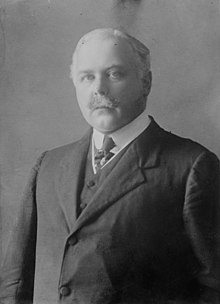The Lord Murray of Elibank | |
|---|---|
 | |
| Comptroller of the Household | |
| In office 18 December 1905 – 5 June 1909 | |
| Monarch | Edward VII |
| Prime Minister | Sir Henry Campbell-Bannerman H. H. Asquith |
| Preceded by | The Viscount Valentia |
| Succeeded by | The Earl of Liverpool |
| Under-Secretary of State for India | |
| In office 5 June 1909 – 14 February 1910 | |
| Monarch | Edward VII |
| Prime Minister | H. H. Asquith |
| Preceded by | Thomas Buchanan |
| Succeeded by | Hon. Edwin Samuel Montagu |
| Parliamentary Secretary to the Treasury | |
| In office 14 February 1910 – 7 August 1912 | |
| Monarchs | Edward VII George V |
| Prime Minister | H. H. Asquith |
| Preceded by | Jack Pease |
| Succeeded by | Percy Illingworth |
| Personal details | |
| Born | 12 April 1870 |
| Died | 13 September 1920 (aged 50) |
| Nationality | British |
| Political party | Liberal |
| Spouse | Hilda Murray (d. 1929) |
Alexander William Charles Oliphant Murray, 1st Baron Murray of Elibank PC (12 April 1870 – 13 September 1920), called The Master of Elibank between 1871 and 1912, was a Scottish nobleman and [1] Liberal politician. He served as Parliamentary Secretary to the Treasury (Chief Government Whip) under H. H. Asquith between 1910 and 1912, when he was forced to resign after being implicated in the Marconi scandal.
- ^ Duncan Tanner (13 February 2003). Political Change and the Labour Party 1900-1918. p. 46. ISBN 9780521530538. Retrieved 28 April 2016.